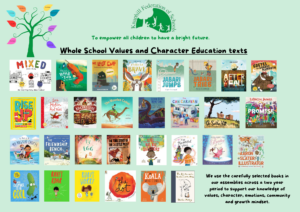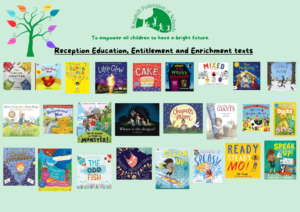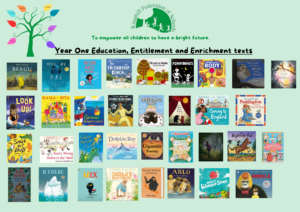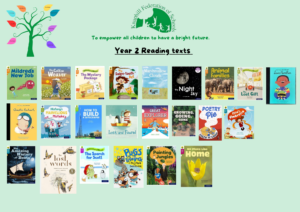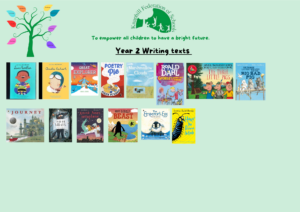Our vision for Reading at Knaphill Lower School:
At Knaphill Lower School, we want every child to see themselves as a reader. We believe in the power of an aspirational English curriculum as this will empower children to develop their ability to communicate confidently, enabling them to share their ideas, emotions and aspirations through their speaking, reading and writing skills. We believe that a knowledge-rich English curriculum will provide a secure basis for children, allowing them to develop the tools they need to participate fully as a member of society. Through inspirational texts, which are at the heart of our reading and writing curriculum, children are given a window into the lives of others, as well as seeing a reflection of their own lives, which are mirrored in our curriculum. Our selected subject content supports children to develop their knowledge of complex issues, giving them an informed voice in a changing world. Our curriculum empowers children to be the voice of a better future for all.
From the earliest stage of learning in the Early Years, we promote quality interactions to facilitate children in developing communication skills and a rich-diverse vocabulary to support an understanding of the world in which they live.
Early reading is given high priority as it is vital for children’s success. We know that reading is key to enabling children to access learning across the curriculum as it allows children to acquire knowledge and to build on what they already know. At Knaphill Lower School, our carefully-selected, DfE approved phonics scheme is Essential Letters and Sounds through which children experience the joy of books and language whilst rapidly acquiring the skills needed to become fluent, confident and independent readers and writers. Our curriculum celebrates literature by giving every child access to the rich variety of texts that they are entitled to experience, and inspires children to develop a lifelong love of reading.
Children use their knowledge and love of reading to become writers who understand the power of the written word and the impact that writing can have upon others. At Knaphill, writing is seen as both a tool of expression of character, a seed of innovation from which change can grow, and a vehicle to share the magic of child’s imagination. As well as creating a love of writing, our progressively sequenced curriculum teaches children the fundamental knowledge to be able to write clearly, accurately and coherently, adapting their language and style in and for a range of contexts, purposes and audiences.
The Intent for our Reading Curriculum is based on ensuring that we have an approach which includes disciplinary knowledge, including:
- All children apply their phonic knowledge to decode and reading words
- All children develop good listening and communication skills.
- All children are curious about language and excited to learn and use new vocabulary
- All children demonstrate good comprehension skills and are able to retrieve, predict, infer, summarise what they have read.
Adapting the curriculum for pupils with SEND in Reading
- Adaptive teaching takes place to meet specific needs.
- Pre-teaching when prior learning is needed before a lesson.
- Daily/half-termly assessment to quickly identify any gaps in knowledge followed by interventions to help all children and those with SEND to “keep up not catch up”
- For sensory or physically impaired pupils, computing learning may necessitate enlarging texts, using clear fonts, using visual overlays, or audio description of images.
- Teachers identify and break down the components of the subject curriculum into manageable chunks for pupils who find learning more difficult, particularly those with cognition and learning needs. These may be smaller ‘steps’ than those taken by other pupils to avoid overloading the working memory. Teachers may use task boards to support a sequence of instructions.
- A variety of additional scaffolds may be used in lessons, such vocabulary banks, additional visual stimuli or adult support.
- provide them with the skills and knowledge they need to read and spell, by direct instruction, progressing systematically with carefully structured, small and cumulative steps
- use instructional routines that become familiar
- provide materials that limit distraction; are clear, linear and easy to follow; are age neutral or age-appropriate and can be adapted further, such as being reduced to individual items
Knaphill Lower School – Curriculum Drivers: Values
Throughout all curriculum subjects, children are given opportunities to apply to Knaphill Lower School values in their learning.
In reading, key values have been identified as:
- Kindness – children are given the opportunity to develop compassion and empathy through being given a window into the lives of others, as well as seeing a reflection of their own lives
- Responsibility – children are given responsibility to develop their independence in reading and writing
- Resilience – children are supported in having resilient learning behaviour and a growth mindset in reading and writing
- Aspiration – texts promote aspirational dreams, feedback promotes children’s aspiration in reading and writing
- Equality – texts are for all, all children are given the opportunity to make accelerated progress by keeping up not catching up
- Curiosity – children develop curiosity about the world through experiences, texts and their acquisition of knowledge
- Courage and honesty – children are using writing as a powerful tool of change
Reading Domains
To ensure that the most useful knowledge is selected within the English reading curriculum, the reading and phonics Leader has used research to determine key reading domains of knowledge.
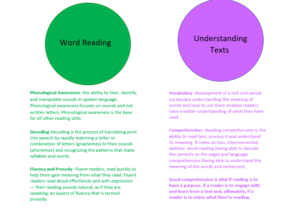
Our Knaphill Lower School Reading Spine:
Our staff are readers, and as readers we select the very best books available for our children. These books are shared in whole class reading sessions, as a stimulus for writing, in class story sessions and as part of our Talk Through Reading lessons.
